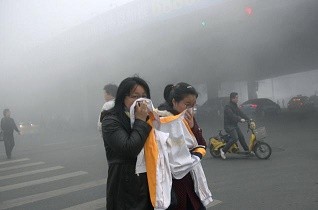An amendment to the Air Pollution Control Law that will regulate various sources of air pollutants and make environmental information more readily available to the public has been adopted by China's top legislature on Saturday.
At the closing of the bi-monthly legislative session, members of the National People's Congress' (NPC) Standing Committee voted that the proposal be passed.
The new amendment includes provisions that indicate a gasoline quality standard that matches the country's restriction requirements for air pollutants.
As of now, China's gasoline has the same standard sulphur content as Europe's, while having significantly higher permitted levels of olefin, arenes and benzene in diesel.
The passed amendment also requires China to promote efficient use of coal, stating that local governments must ban residential use of low-quality coal.
It also bans dispersing toxic pesticides into plants in densely populated areas.
The new amendments to the law also allow government units to place remote sensors on streets to check for possible pollutants being emitted by passing vehicles. This will test for the levels of carbon dioxide, carbon monoxide, carbon hydrate and nitrogen oxide.
Currently, Beijing has plans to install 150 surveillance devices along major roads, according to Li Linnan, vice director of Beijing's vehicle emission control center.
The law now also regulates ships, which are typically fuelled by sulfur-intensive heavy oil. These ships have a large impact on the air quality levels of coastal areas.
The public will now also have more access to documents and reports regarding air quality. Authorities of the State Council must evaluate provincial-level governments based on how well air quality improvement targets are met and make these available to the public under the new law.



























